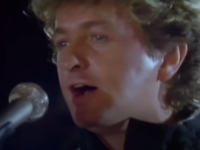Jon Anderson said he was writing more “Yes-style music,” just before releasing the single “Open” in 2011. He was right.
Even more than his well-received subsequent solo album, “Open” was what most people had in mind: A conceptually epic piece, filled with wonderment, musical twists and a theme as broad as it is hopeful.
Quite frankly, this is what Jon Anderson does. And it was terrifically engaging, after too long spent fitting his muse into the ever-dilating strictures of Yes’ modern-day prog-pop, to hear him doing it again.
“Open” revealed itself as a sweeping 21-minute opus featuring soaring vocals, thundering orchestral outbursts and sun-streaked lyrics. Along the way, Anderson deftly recalled the long-form triumphs of “Close to the Edge” and “Gates of Delirium,” even as he escapes from their long-assumed parameters.
That starts with his string-focused musical structure: Led by Stefan Podell, the orchestra moves from diaphanous atmospherics to crashing salvos of sound and fury. While there are keyboards and brief flurries of guitar, “Open” has a much tighter focus on the layered vocal interplay that has marked so many of his own compositions, both with his old band and as a solo artist.
Freed not just of the expectations so closely associated with Yes — the classically imbued Steve Howe solo, the thumping Chris Squire bass, the mad-scientist Rick Wakeman keyboard wizardry — but of the politics and the personalities themselves, Jon Anderson hadn’t sounded more present, more completely sure of himself, in decades.
There will be those fans who miss the classically imbued Howe solo, etc., etc. Part of the magic, and the tragedy, of Yes is its very internecine nature. In their worst moments, you had snitty little side projects like Anderson Bruford Wakeman Howe — the equivalent of calling a car “Steering Wheel, Transmission, Radials and Chassis.” In their best moments, though, those competing dynamics made for brilliant and complex rock music.
Either way, Jon Anderson’s compositions away from them (exultantly, blissfully joyous though they may be) sometimes lack that essential friction. You can’t blame Anderson for that, though. It’s the role he always played with Yes — and it’s what he took with him. “Open” brought it all home again.
- The Bright Spots in George Harrison’s Troubled ‘Dark Horse’ Era - December 29, 2024
- The Pink Floyd Deep Cut That Perfectly Encapsulates ‘The Wall’ - November 29, 2024
- Why Pink Floyd’s ‘The Endless River’ Provided a Perfect Ending - November 11, 2024



